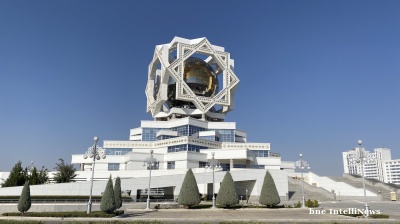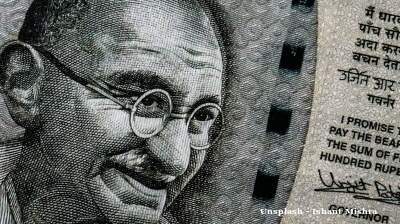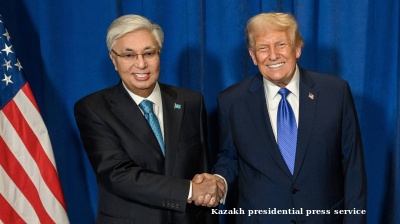Following more than a year of cross-border violence between Israel and Lebanese Hezbollah, a sense of calm is slowly returning to Beirut. Al-Qard Al-Hassan, a financial institution that provides interest-free loans, has reopened some of its branches, allowing customers to access basic banking services, including cash withdrawals and gold transactions, according to a statement on December 2.
The reopening of the Hezbollah-controlled microfinancing group marks a significant shift toward normality in the Lebanese capital after months of Israeli airstrikes that have left more than 3,961 men, women and children dead. The message sent to depositors of Al-Qard Al-Hassan Association after several of its branches were hit in Israeli strikes also hints at more normal operations for its clients on December 3 morning at 16 branches, five days after the ceasefire agreement between Hezbollah and Israel.
The reopening of its branches development brings the issue of compensation for residents of southern Lebanon back into focus. The border region, which witnessed intense battles between Israel and Hezbollah, is now seeing the Lebanese government allocate LBP1 trillion (around $10mn) from the 2024 budget to compensate those affected.
Demands for Compensation
Residents of southern Lebanon, predominantly from the Shia community, are urging Hezbollah to fulfil its previous promises of compensation for the material and physical damages they suffered due to Israeli strikes. However, doubts persist about the party’s ability to meet these commitments, especially after Israeli attacks targeted Hezbollah’s financial institutions, including Al-Qard Al-Hassan.
Before the ceasefire, the Israeli military claimed to have targeted 25 sites linked to Hezbollah’s executive council across Nabatieh, Baalbek, the Bekaa Valley, the southern suburbs, and the outskirts of Beirut. These strikes allegedly included “command and control centres and intelligence facilities,” raising concerns about the fate of the financial assets and guarantees managed by Al-Qard Al-Hassan.
What is Al-Qard Al-Hassan?
Established in 1982 following Israel’s invasion of Lebanon with the help of Iran's young Islamic Republic, the Al-Qard Al-Hassan Association received an official license from the Lebanese Ministry of Interior in 1987 to conduct banking activities. According to its website, the association aims to "assist people by providing fixed-term loans" to help address "certain social challenges."
The association previously operated 31 branches across three main regions: Beirut, the South, and the Bekaa Valley. In 2023, it announced plans to expand its operations, opening new branches amidst Lebanon’s ongoing economic crisis. The association claims it offers loans for various purposes, including solar energy systems, industrial and agricultural development, housing purchases or construction, and marriage assistance.
The organisation claims to "attract charitable contributions and provide them as interest-free loans," as usury, or the adding of interest to banking services, is technically illegal in Muslim culture.
Controversy Over Legality
The United States has imposed sanctions on Al-Qard Al-Hassan, accusing it of "illegally transferring funds" to Hezbollah and "undermining the stability of the Lebanese state." Saudi Arabia has also designated it as a "terrorist entity."
From a legal perspective, critics argue that the association operates unlawfully, lending money based on deposits without authorisation from the Central Bank of Lebanon. With deposits estimated to be billions of dollars, Al-Qard Al-Hassan has become one of the largest financial entities in Lebanon.
The association provides services similar to conventional banks, such as deposits and loans. Leaked documents have revealed accounts tied to Iranian organisations and companies linked to the Iranian government, including the Martyrs and Veterans Foundation and Imam Khomeini Relief Committee in Iran. Similar entities also exist inside Iran, offering many of the same loans.
Reports also indicate that Iranian Supreme Leader Ali Khamenei holds an account under the title *Wali al-Faqih*. Additional accounts are reportedly allocated to support Yemen’s Houthis and Yemeni children.
Lebanese Economy Minister’s Remarks
Lebanese Economy Minister Amin Salam told IntelliNews that the state would monitor Al-Qard Al-Hassan s activities after the war, as the association is subject to international sanctions.
"For the state, Al-Qard Al-Hassan is an illegal institution. However, the Lebanese government has been unable to take necessary action. The Ministry of Finance and the Central Bank should have intervened [earlier]," he said.
Salam likened the situation of Al-Qard Al-Hassan to the issue of Hezbollah’s unauthorised weapons, describing both as unresolved political matters.
While he acknowledged that Al-Qard Al-Hassan might serve citizens in some areas better than traditional banks, Salam emphasised its illegality in operations. He added that any government measures against the association depend on broader political conditions, with agreement from Shi’ite groups being the key sticking point.
Salam expressed optimism regarding Lebanon’s economic future, highlighting international willingness, including from Arab nations, the US, and the EU, to support reconstruction efforts if Lebanon demonstrates serious reforms. He outlined a two-year timeline for domestic restructuring, including presidential elections, forming a government, and implementing an economic plan focused on reconstruction, refugee issues, and structural reforms. Following this, Lebanon could attract foreign investment over 3-5 years.
Economic Losses
Speaking with IntelliNews, economic expert Nassib Ghobril estimated the war’s damages at $8.5bn as of September, encompassing destruction to buildings and infrastructure. He warned that total economic losses could reach $38bn if challenges persisted.
Ghobril stressed the need to restructure the banking sector to reduce the reliance on cash-based transactions, which would help Lebanon exit the Financial Action Task Force’s (FATF) grey list. He also highlighted the urgency of post-war reconstruction, estimating three years would be required to rebuild southern Lebanon, the Bekaa Valley, and the southern suburbs, representing about 25% of Lebanon’s GDP.
Depositor Trust
Despite challenges, many Lebanese depositors express greater trust in Al-Qard Al-Hassan than in traditional banks. One depositor told IntelliNews, "Al-Qard Al-Hassan has supported many during the economic crisis, while traditional banks failed to release depositors’ funds."
The depositor remembered how the association had previously safeguarded their collateralised gold during the 2006 war and returned it intact. They added, "I fully trust Al-Qard Al-Hassan but not the banks, which have withheld people’s money."
Features

Washington has a new focus on a Caspian energy play
For most of the last three decades since winning independence, Central Asia has been a bit of a backwater. Not any more. The Trump administration is becoming more focused on Turkmenistan's vast gas reserves and can smell money and power there.

BOTAŞ and Turkey’s hub ambition: from “30-year dream” to cross-border reality
For Ankara, the symbolism is as important as the molecules: Turkey’s energy map is shifting from end-market to hub.

Indian bank deposits to grow steadily in FY26 amid liquidity boost
Deposit growth at Indian banks is projected to remain adequate in FY2025-26, supported by an improved liquidity environment and regulatory measures that are expected to sustain credit expansion of 11–12%

.jpg)

_Cropped_0_1758503358.jpg)

